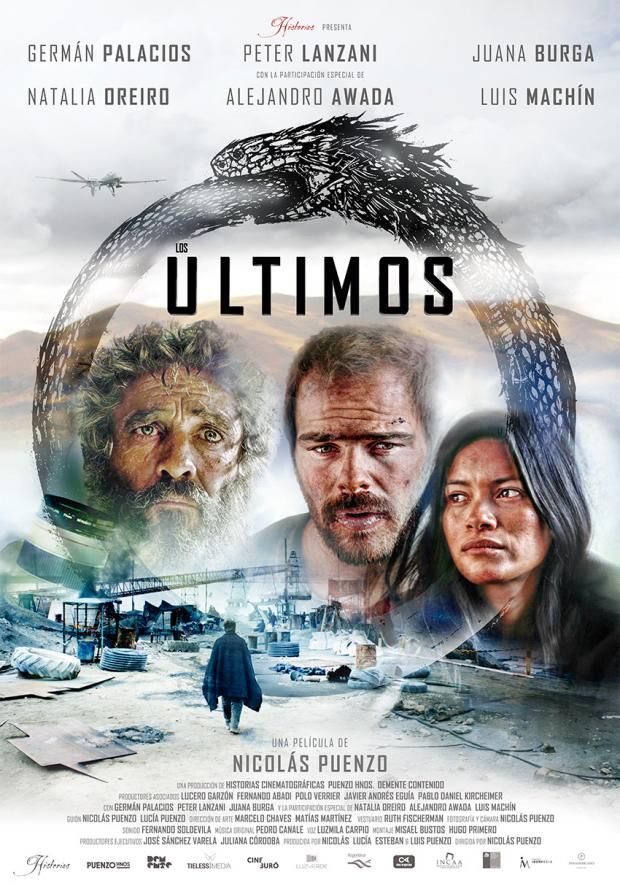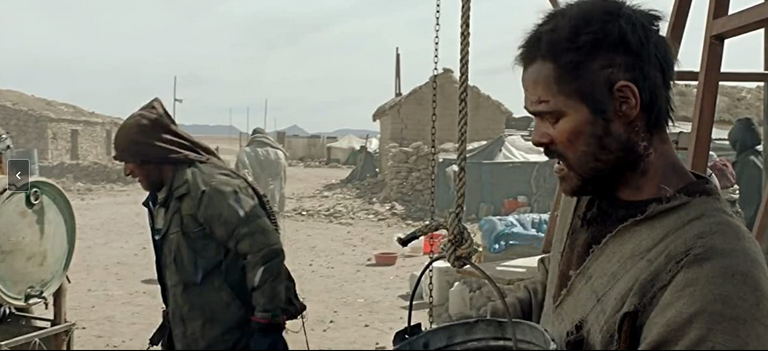
Good morning my dear cinephile community.
After a few days without posting due to particular commitments of my professional and working life that have prevented me from taking the proper contact with you, here I am again soon to share with all users memories of movies and series, some seen recently others seen for some time now, that have remained engraved in my memory.
Today I bring you one of the most pleasant surprises -at least for me- in a genre that we could call apocalyptic and science fiction.
That is to say, a plot set in the near future, perhaps so near that it seems current, and a hot topic such as the environment.

Muy buenos días mi querida [comunidad cinéfila.
Después de unos días sin publicar debido a compromisos particulares de mi vida profesional y laboral que me han impedido tomar el debido contacto con Uds. aquí estoy de nuevo pronto a compartir con todos los usuarios recuerdos de películas y series, algunas vistas de recientes otras vistas desde hace ya un tiempo, que me han quedado grabadas en la memoria.
Hoy les traigo una de las más agradables sorpresas -al menos para mí- en un género que podríamos llamar apocaliptico y de ciencia ficción.
Es decir un argumento ambientado en un futuro próximo, tal vez tan próximo que parezca actual, y un tema tan candente como es el medio ambiente.

Los Ultimos is an Argentine film that we could frame in the modern post-apocalyptic thriller, fairly new -from 2017- that has gone relatively unnoticed from the big pre-pandemic billboards directed and co-written by Nicolás Puenzo (son of the celebrated Luis Puenzo who immortalized Argentine and Latin American cinema in 1986 with the unforgettable La Historia Oficial his first feature film winner of the Oscar for Best Foreign Film) and starring the Argentine Peter Lanzani and the Peruvian Juana Burga.
If we were referring to a Quentin Tarantino film and talking about dystopian science fiction, Tarantino western, apocalyptic thriller and classic melodrama, we would not be discovering anything new. It is the very essence of his films.
But if we are talking about a new director, in his first feature film, carrying on his back the weight of a cinematographically illustrious surname, now the test is very hard. And yet Nicolás Puenzo passes the test with flying colors. Adding the necessary quota of criticism to an expansive economic model that is degrading and ruining the planet: the mega-mining industry.


Los Ultimos es una película argentina que podríamos encuadrar en el moderno thriller post-apocalíptica, bastante nueva -del año 2017- que ha pasado relativamente desapercibida de las grandes carteleras pre-pandemia dirigida y coescrita por Nicolás Puenzo (hijo del celebrado Luis Puenzo que inmortaló el cine argentino y latinoamericano en el año 1986 con la inolvidable La Historia Oficial su primer largometraje ganador del Óscar a la mejor película extranjera) y protagonizada por el argentino Peter Lanzani y la peruana Juana Burga.
Si nos estuviéramos refiriendo a un film de Quentin Tarantino y habláramos de ciencia ficción distópica, el western tarantiniano, thriller apocalíptico y el melodrama clásico no estaríamos descubriendo nada nuevo. Es la esencia misma de sus películas.
Pero si hablamos de un director nuevo, en su primer largometraje, llevando sobre sus espaldas el peso de un apellido cinematográficamente ilustre, ahora la prueba es muy dura. Y sin embargo Nicolás Puenzo supera el examen sin ningún obstáculo. Agregando la necesaria cuota de crítica a un modelo expansivo económico que está degradando y arruinando el planeta: la megaminería

The characters in the film are few but very well calibrated with the plot: a young refugee couple (Yaku and Pedro) who try to elude the police encirclement, a war correspondent, photographer (Ruiz) who previously thought of suicide and after meeting them recovers his faith in life, they begin a journey that descends from the highlands must end in the Pacific Ocean, dodging a thousand obstacles and risking their lives in continuation.
Spies, traitors, torturers appear in the background as decorative elements of the film in the best Tarantino style.
The film raises several questions: What would happen if the always feared war for water was finally carried out, disregarding all peace initiatives, and a powerful army invaded and took over the north of Argentina, establishing a transit system of absolute control?
What would happen if the mega-mining, today so criticized in countries such as Argentina and yet widespread from the north to the south of the country with rich deposits of lithium in the north and gold in the south for the extraction of which fracking and cyanide are used, poisoning entire subway water tables, would fulfill the worst predictions in this regard?
We would probably have, then, a panorama very similar to the one shown by Nicolás Puenzo in Los Ultimos.
An environment that shows us a territory devastated by mega-mining, with few civilian survivors living in overcrowded shelters, many of them subway in the middle of the desert.
Watching the journey of the two young men reminds me in some aspects of Mad Max with an incredible young Mel Gibson. Only the motorcycles are missing. In Puenzo's film we have the military trucks to match them amid spectacular aerial shots and the majesty of the desert terrain.
The result is always a bit hallucinating with a scenery we are not used to seeing, with lots of copper-colored shots -the mineral of the area-, trapping and hypnotic in that wonderful desert nature.
New characters are added to the plot such as the doctor (Natalia Oreiro), the photographer (Germán Palacios) and the contractor or intermediary (Alejandro Awada) who add allegorical weight to the film, slowly leading it to the denouement with a very specific and eloquent message.
Los personajes de la películados son pocos pero muy bien calibrados con el argumento de la misma: una joven pareja de refugiados (Yaku y Pedro) que trata de eludir el cerco policial, un corresponsal de guerra, fotógrafo, (Ruiz) que antes pensaba en el suicidio y luego de conocerlos recupera su fe en la vida, inician una travesía que bajando desde el altiplano tiene que terminar en el Océano Pacífico, sorteando mil obstaáculos y poniendo en riesgo la vida en continuación.
Espías, traidores, torturadores van apareciendo de soslayo como elementos decorativos de la película al mejor estilo Tarantino.
Los interrogantes que se plantea la película son varios: ¿Qué pasaría si la siempre temida guerra por el agua se llevara finalmente adelante despreciando todas las iniciativas de paz y un poderoso ejército invadiera y se adueñara del norte de la Argentina instaurando un sistema de tránsito de control absoluto?
¿Que pasaría si la megaminería hoy tan criticada en países como Argentina y sin embargo muy difundida desde el norte hasta el sur del país con ricos yacimientos de litio en el norte y oro en el sur para cuya extracción se usa el fracking y el cianuro envenenando enteras napas de agua subterráneas, cumpliera con los peores pronósticos al respecto.?
Tendríamos, entonces, probablemente un panorama muy similar al que nos muestra Nicolás Puenzo en Los Ultimos.
Un ambiente que nos muestra un territorio devastado por la megaminería, con pocos sobrevivientes civiles que viven hacinados en refugios muchos de ellos subterráneos en medio del desierto.
Viendo el recorrido de ambos jóvenes me recuerda en algunos aspectos Mad Max con un increíble y joven Mel Gibson. Faltan solo las motocicletas. En el film de Puenzo tenemos los camiones militares para equipararlas en medio de espectaculares planos aéreos y la majestuosidad del terreno desértico.
El resultado es siempre un poco alucinante con un escenario al que no estamos acostumbrados a ver, con muchísimos planos color cobre -el mineral de la zona-, atrapante e hipnótico en esa maravillosa naturaleza desértica.
Nuevos personajes se van agregando a la trama como la médica (Natalia Oreiro), el fotógrafo (Germán Palacios) y el contratista o intermediario (Alejandro Awada) que le van agregando un peso alegórico a la película llevándola lentamente al desenlace con un mensaje muy específico y elocuente.

Germán Palacios as Ruiz.
Peter Lanzani as Pedro.
Juana Burga as Yaku.
Natalia Oreiro as Dr. Ortega.
Alejandro Awada as the contractor or middleman.
Germán Palacios como Ruiz.
Peter Lanzani como Pedro.
Juana Burga como Yaku.
Natalia Oreiro como la Dra. Ortega.
Alejandro Awada comno el contratista o intermediario
Source/Fuente: IMDB.

If it were a Hollywood production we would say "in the norm", but we are talking about an Argentine-Chilean production, with all the limited technical and economic resources we can imagine.
Without the sponsorship of big companies because in reality the heart of the matter is the critique of an economic system that they themselves promote.
In the midst of this lack of resources, Puenzo produces an excellent cinematographic product worthy of the highest praise.
Perhaps the secondary characters seem a bit empty of content. And perhaps what could be a criticism is, in my opinion, its greatest virtue: instead of engaging in a political-economic discourse on the disasters of mega-mining, the protagonists repeatedly show, throughout the film, only one side of the tragedy: that of the desperation to reach their destination.

Si fuera una producción hollywodiana diríamos "en la norma", pero estamos hablando de una producción argentino-chilena, con toda la limitación de recursos técnicos y económicos que podamos imaginar.
Sin el auspicio de grandes empresas porque en realidad el meollo de la cuestión es la crítica a un sistema económico que ellas mismas promueven.
En medio de esa orfandad de recursos Puenzo elabora un óptimo producto cinematográfico digno del mayor de los elogios.
Tal vez los personajes secundarios parezcan un poco vacios de contenido. Y tal vez lo que puede llegar a ser una crítica es, a mi jucio, su mayor virtud: en vez de entablar un discorso político económico sobre los desastres de la megaminería, los protagonistas muestran repetidamente a lo largo de toda la película, una sola cara de la tragedia: la de la desesperación por llegar a destino.


Sources consulted (my property) for the preparation of this article. Some paragraphs may be reproduced textually.
Fuentes consultadas (de mi propiedad) para la elaboración del presente artículo. Algunos párrafos pueden estar reproducidos textualmente.
| Argentina Discovery. |  |
|---|---|
| Galería Fotográfica de Argentina. |  |
| Viaggio in Argentina. |  |
| Patagonia Express. |  |

Muy buena reseña me dieron ganas de ver la película.
Gracias por comentar y apoyar mis contenidos @bigbdp.
Upvoted. Thank You for sending some of your rewards to @null. Read my last posts to make sure that BLURT burning is profitable for you. Before using this bot please make sure your account has at least 100 BP. Get more BLURT:
@ mariuszkarowski/how-to-get-automatic-upvote-from-my-accounts@ blurtbooster/blurt-booster-introduction-rules-and-guidelines-1699999662965@ nalexadre/blurt-nexus-creating-an-affiliate-account-1700008765859@ kryptodenno - win BLURT POWER delegation@ ctime/burn-bot-liquid-blurtThanks @ctime